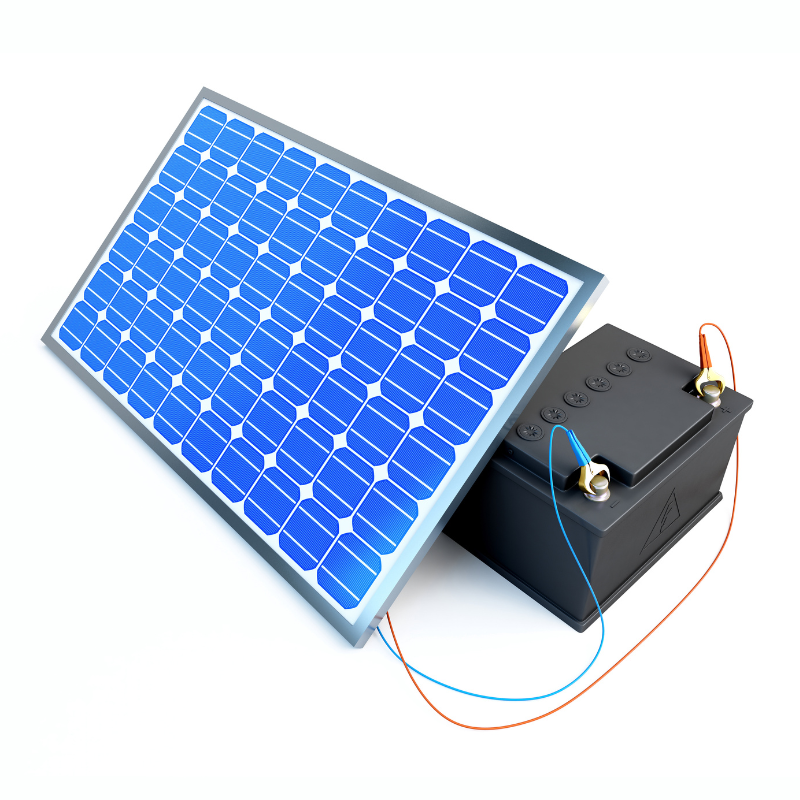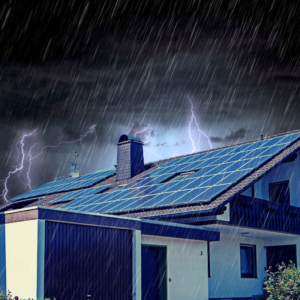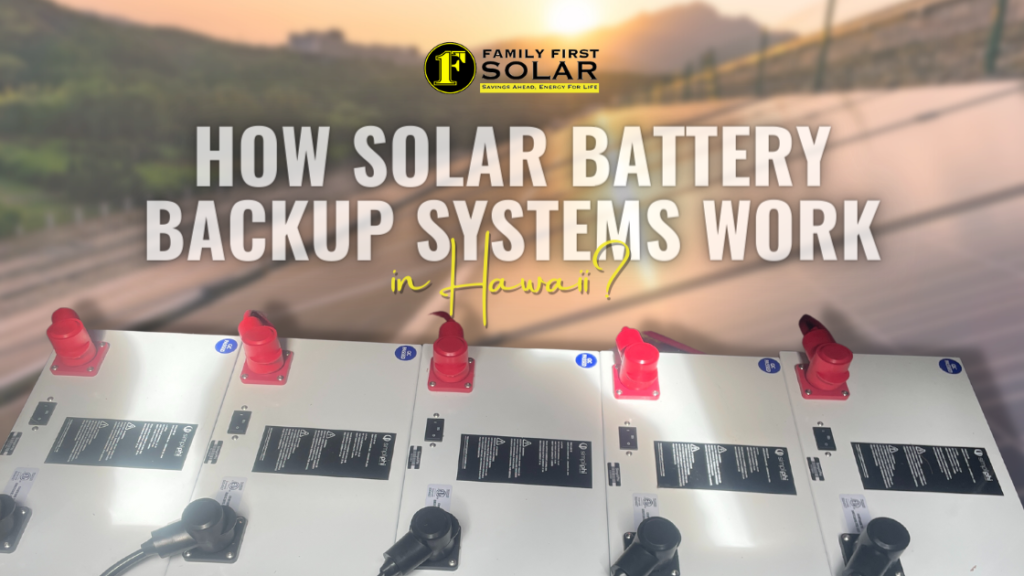How Solar Battery Backup Systems Work in Hawaii
For our solar clients in Hawaii, we encourage people to buy solar batteries along with their solar system. This isn’t just so we can tag another line item on your invoice. Depending on your reasons for going solar, adding solar batteries to your solar system might be necessary to help you accomplish your goals.
In this article, we will talk about how solar batteries work, why you would choose to include solar batteries in your solar system, and what to watch for with the battery rebates from HECO.
By the end of this article, hopefully, you’ll have a good understanding of why most residential solar systems include solar batteries here in Hawaii.
Goals for Going Solar
Everyone has their reasons for going solar. Some people focus on saving money and the tax benefits, while others are more passionate about the environment. And while this is a both/and situation, here in Hawaii specifically, more and more consumers want to go solar to get off the grid.
This is because people don’t necessarily have a lot of trust in our leading local utility, HECO. And prices of fossil fuels continue to skyrocket. More consumers are getting fed up with their high electric bills and switching to solar.
Drawing from the utility versus solar batteries
Some of our clients are happy to get the majority of their energy from their solar panels and continue to get just a small amount of energy from grid electricity when they need it. These clients report very low utility bills, which is great!
Keep in mind though, if you go this route, unless you’re paying for your solar panels with cash, you’ll still have two separate bills—one to your solar financing company and one to your utility company.
You still may save money overall, but it does add an extra thing to think about (two bills to pay instead of one.) And this route doesn’t provide complete energy self-sufficiency.
Enter solar batteries. If you’re ready to break up with the utility company completely and energy self-sufficiency is one of your goals of going solar, you’ll need to include solar batteries in your solar panel system.
How Do Solar Batteries Work?

In a recent blog, we did a deep dive into how solar energy works. But to do a quick recap, solar panels are made from materials that are semiconductors—meaning, they conduct electricity. When the sun’s photons excite the electrons in this material, the movement of the electrons creates a current, which we’re able to channel into usable energy for your home through an inverter.
In Hawaii, this works great because we have constant sun. In fact, we live in one of the best states in the country for solar energy. But what happens at night? Or if it’s cloudy? These are questions we get all the time.
And, as we already touched on, you can either use grid electricity when the sun isn’t shining, or you can store excess solar energy in a solar battery to use when you need it.
Solar Battery 101
Solar batteries exist so you have energy to use when your solar panels aren’t generating energy. And, when the sun is shining, you’re likely creating more power than you can actually use. So, you might as well store that excess solar energy so you can use it in case of a power outage, at night, or on a cloudy day.
Solar batteries can be installed as a part of your solar panel system, and this is how many people in Hawaii choose to do it.
Solar batteries are lithium ion batteries, which work through a chemical reaction. Solar energy created in your panels goes into the battery before it’s converted into electric energy.
If you dig back to your memories from high school chemistry, you might remember that batteries have a cathode and an anode, a positive and negative end. Electrons from your solar panels can flow into your solar battery and be stored on the negative end, recharging the solar battery and creating energy ready to be used.
Just like solar energy coming hot off your solar panels to your home, the current still has to pass through the solar inverter to be turned from DC electricity that can only move one direction to AC electricity that can move both directions, which you need in your home.
How long will a backup battery work?
Solar batteries are designed to be used for a long time. When your home pulls energy out of the battery, it can simply be filled back up again. Unlike most normal batteries with a limited lifetime, a lithium ion battery is a technology used in electric cars and smartphones. A lithium ion battery is designed to be recharged over and over again.
Many manufacturers offer a 10-year warranty on the battery system, and often, batteries will long outlast their warranty, from our experience.
Can you have electricity with just solar panels?
You do not need to have solar batteries to power your home. Solar panels and a solar inverter are all you need to create electricity for your home. The trouble comes when you need backup power, whether at night when your solar panels can’t create energy, in a storm, or in the case of power outages. That’s where Hawaii residents find solar batteries useful.
Additional equipment needed for solar battery installs
A solar battery system doesn’t require much additional equipment if you’re already having a solar power system installed. One thing you will have to account for is space.
A battery system takes up quite a bit of space, so you’ll have to figure out with your solar technician where the best place for them is. Some people choose a space in the garage, while others have them mounted on the home’s exterior.
What are the Benefits of Solar Battery Storage?

While solar batteries are an additional cost, there are numerous benefits to adding them to your solar system, especially here in Hawaii. Here are some of the top benefits.
Provides Relief from Power Outages
Imagine you have a solar panel system, and it’s nighttime. You’re accustomed to using power from the utility company at night, which hasn’t been a problem. But if there is a power outage, you’ll experience one just like everyone else.
With a solar battery, you won’t have a power disruption at all, even when your neighbors using grid power do. You might not mind a 20-minute, fluke power outage every once in a blue moon. But in the case of emergency and longer outages, having solar power stored up could make a big difference in the well-being of your family.
Stable Energy Rates
One of the main reasons people in Hawaii are going solar is the increasing price of their electricity bill. Traditional electricity is more expensive in Hawaii than almost anywhere else in the country. If you’re sick of fluctuating utility bills, even if it’s just the small portion that’s not covered by your solar energy, solar batteries would be a great fit for you.
Energy Self-Sufficiency
Many people like the idea of being “off the grid” and not having to rely on the utility for anything. Energy self-sufficiency means that in the case of an emergency, your home will function as usual when it comes to power.
Reduce Your Carbon Footprint
Energy self-sufficiency also means you’re reducing your carbon footprint. Your household is creating all of the energy you need to operate. Operating your home without the use of fossil fuels is less taxing on the environment.
Why Use Solar Battery Storage in Hawaii?
Solar batteries and a common sense choice here in Hawaii. Yes, they are an additional cost, but they are also a part of the expense eligible for federal and state rebates. Check out our recent blog to learn even more about the incentives for going solar in Hawaii. The short of it is that you can get 2/3 of your entire solar investment reimbursed to you through tax credits.
Beware of Solar Battery Specific Rebates
Because of the failure of net metering programs in Hawaii, HECO is currently offering a rebate on new solar battery installs. But, we advise people that when you read the fine print, it’s a truly terrible deal.
The incentive stipulates that the utility can pull power from your batteries during peak hours, forcing the homeowner to drain their system and pay the double price rate at peak hours when they have to utilize power from the utility company.
If someone tries to tell you this incentive is a good deal, make sure you investigate the fine print because we bet you’ll draw the same conclusion that we have—that this rebate is a bad deal for residential solar customers.
You Can’t Lose With Solar Energy Storage
Solar energy storage is the smartest way to deal with excess solar energy here in Hawaii. In our own past, and currently in other states, homeowners could participate in a net metering program and get money back for sending their excess energy to the grid.
But since the collapse of net metering, solar batteries are the most common-sense option for homeowners in Hawaii. Increase your energy self-sufficiency and your solar footprint, enjoy a stable payment, and experience relief during power outages.
Contact Family First Solar Today
Contact Family First Solar to get started with a free solar system estimate, including battery storage.


